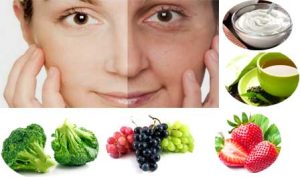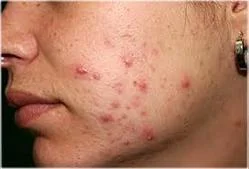What is the best vitamin for skin repair and elasticity?
There are three main vitamins that help your skin stay elastic by protecting it from the sun, according to a May 2015 study in Biomolecules & Therapeutics: vitamin A, vitamin E and vitamin C. All three are antioxidants, although they play different roles in skin repair. Keep in mind that they can slow the aging process, but can’t reverse it. Unfortunately, there aren’t vitamins to tighten loose skin.
Vitamin A, in the form of retinol, is found in many skin creams. According to an article from the Linus Pauling Institute, it can protect your skin from harmful UV rays if you apply it before being exposed to sunlight.
According to the article, applying retinoid cream can reduce signs of skin aging like wrinkling, freckles and roughness. Vitamin A supports collagen, which might be why it’s so beneficial for skin health.
As an antioxidant, vitamin E can help your skin stay elastic. It helps protect your skin from harmful UV rays, which can damage elastin. While it’s no replacement for sunscreen, vitamin E can help you in the battle against skin-damaging UV rays.
Vitamin E is a fat-soluble vitamin, which means the best way to get it is by eating certain fatty foods. Vegetable oils, nuts, seeds and green leafy vegetables are all high in vitamin E, according to MedlinePlus.
skin repair
Which vitamin is good for skin repair after micro needling?
Vitamin C, also known as ascorbic acid, is required for the synthesis of collagen. It is also a highly effective antioxidant protecting cells from damage by free radicals. Studies have shown that the vitamin can help speed the healing process of acne scars.
Imeedin supplement promot collagen production and help skin repair after Micro needling.
Visit on Amazon
What is the best vitamin for healing after skin subcision?
A normal diet may not be enough to supply adequate levels of certain nutrients that are essential for the wound healing process. In these scenarios, supplementation is vital to bridge the nutrition gap.
- Arginine and glutamine : During times of trauma, the body lacks enough of these essential amino acids, meaning you’ll have to increase your intake to get more of them. Arginine helps to promote the production of protein, enhances cell growth, triggers collagen production, strengthens immune function and promotes blood flow. Glutamine also promotes collagen production and supports a healthy immune system. Together, these activities help support vital repair and rebuilding.
- Hydrolyzed collagen : This is collagen that’s been broken down into building blocks, providing our bodies with the raw materials needed to cover a wound. It helps to increase the body’s collagen level and stimulates the production of internal collagen at the wound site.
- HMB : Short for β-hydroxy-β-methylbutyrate, HMB is a metabolite of the amino acid leucine. HMB helps slow muscle breakdown while also spurring protein synthesis.
- Zinc : This mineral aids in DNA and protein synthesis, immune function and skin integrity.
- Vitamins C and E : These antioxidants help the body recover and manage cell damage. Vitamin C helps improve collagen strength, while vitamin E assists in stabilizing cells.
-
- Vitamin B12 : This vitamin increases levels of red blood cells and hemoglobin, allowing the body to easily get oxygen and nutrients to the incision site for healing. It also helps spur collagen production.

Which vitamin is good for skin whitening after laser treatment?
Vitamin C is essential for an even skin tone and a glowing complexion. The daily requirement of vitamin C is 90 mg in men and 75mg in women in normal, healthy conditions. Citrus fruits such as lemons, tangerine, grapefruit, etc. Tomatoes, green and red peppers, green vegetables like broccoli, etc
What is the best vitamins for skin repair?
Vitamin D is one of the best vitamins for your skin, along with vitamins C, E, and K. Making sure you get enough vitamins can keep your skin looking healthy and youthful. This could translate to a reduction in: dark spots.
Eating foods that contain antioxidants regularly can help make your skin look younger and healthier. Antioxidants are agents that fight off the free radicals and are believed to have some role in the anti-aging process.
Vitamin C in the form of L-ascorbic acid can be used orally and topically for skin benefits. It is found abundantly in foods such as citrus fruits, blackcurrant, rosehip, guava, kiwi, pomegranates, chili pepper, and parsley.
Vitamin C plays a role in stabilizing collagen, which is an important compound that helps the skin stay firm and tight. Moreover, it plays a role in iron absorption and increases the bioavailability of selenium. Iron and selenium help prevent photo-induced skin damage, a factor that accelerates skin aging.
How does vitamin E help your skin look younger?
Eating products rich in vitamin E protects against skin aging by reducing collagen cross-linking and lipid peroxidation at the cellular level.
Additionally, vitamin E protects against sun-induced skin damage by increasing the skin’s defense against wear and tear caused by ultraviolet (UV) light.
You can get your daily dose of vitamin E from oils such as wheat germ oil, sunflower oil, and safflower oil, as well as seeds, corn, and soy.
How does vitamin A help your skin look younger?
Vitamin A is an essential nutrient that supports skin health in addition to promoting reproductive health and immune function. It exists in the form of compounds known as carotenoids. Beta-carotene, lycopene, and retinol are all highly effective antioxidants.
Beta-carotene
- Helps prevent UV light-induced redness (erythema)
- Found in yellow, orange, and green fruits and vegetables, such as carrots, spinach, lettuce, tomatoes, broccoli, cantaloupe, sweet potatoes, and winter squash
Lycopene
- Helps prevent skin discoloration and texture changes
- Boosts procollagen levels in the skin that can slow down the skin aging process
- Found in tomatoes and other red fruits and vegetables such as red carrots, watermelons, and papayas
Natural retinol
- Improves fine lines and smooths uneven complexions
- Found in foods such as beef liver, lamb liver, milk, egg yolk, cheese, fatty fish (salmon, sardines, tuna), cod liver oil, and prawns
- Excess consumption A through supplements can be dangerous



Leave a Reply